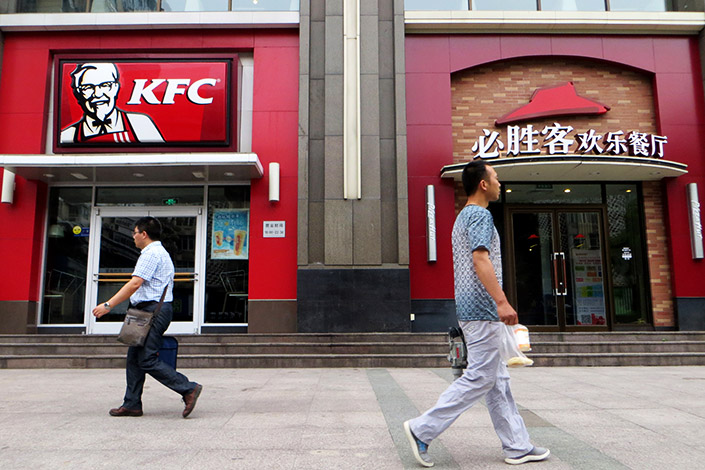Yum China Posts Flat Same-Store Sales in Maiden Report

(Beijing) — Fast-food giant Yum China reported flat same-store sales and falling revenue in its maiden quarterly report as it tries to reverse a longer-term decline with more autonomy after a spinoff from its U.S. parent late last year.
The operator of the KFC and Pizza Hut chains in China has struggled in the market over the last five years due to a number of factors, including growing local competition and several food-safety scandals. Both Yum and U.S. rival McDonald’s Corp. have taken steps to overhaul their respective stores by modifying menus and adding features to cater to China’s younger tech-savvy and affluent middle class. Yum China’s moves include plans to introduce Taco Bell restaurants on the mainland. The first and to date only mainland-based Taco Bell officially opened in Shanghai last month.
To give its operations more flexibility, Yum’s U.S. parent spun off its China business late last year and introduced two locally based strategic investors. McDonald’s made a similar move last month by selling a majority of its China restaurants to two partners, including leading financial services conglomerate Citic Group.
Yum China Holdings Inc. said its same-store sales were flat in last year’s fourth quarter and for the entire year, according to its first quarterly financial report released in the U.S. on Tuesday. Same-store sales, a widely watched indicator for retailers, reflect the amount of sales in company stores that have been open at least a year.
Fourth-quarter revenue fell 3% to just under $2 billion. It posted a small profit of $88 million, reversing a $29 million loss from the previous year.
Yum China also announced a $300 million share repurchase program just three months after formally separating from its U.S.-based parent, Yum Brands. The company currently operates 7,500 restaurants in China, about 70% of those KFCs, making it the market’s biggest operator.
“We continue to focus on our long-term growth formula: new unit development, same-store sales growth, and continued restaurant margin improvement,” CEO Micky Pant said. “Right now, our top priority is consistently delivering positive same-store sales growth.
Despite its recent adjustments, Yum still faces a number of headwinds in the market, said Huang Xiaobin, CEO of catering consulting firm Bestown. Those include its reliance on Western-style food in a market that favors local tastes. Another is the rapid rise of internet-based alternatives, most notably a recent boom in online take-out ordering services, Huang said.
“I’m not confident that we’ll see any major improvements for Yum China in the next three years,” he said. “The kinds of changes they’re making will probably take at least five years to show results.”
Contact reporter Yang Ge (geyang@caixin.com)

- 1China Officials Dismiss Tax Hike Rumors After Tech Selloff
- 2Cover Story: How Gutter Oil Became a Prized Fuel for International Airlines
- 3Prominent Chinese Journalist Liu Hu Detained by Police in Chengdu
- 4Maersk Unit Takes Over CK Hutchison Panama Ports After Court Ruling
- 5China Provinces Set Cautious 2026 Growth Targets
- 1Power To The People: Pintec Serves A Booming Consumer Class
- 2Largest hotel group in Europe accepts UnionPay
- 3UnionPay mobile QuickPass debuts in Hong Kong
- 4UnionPay International launches premium catering privilege U Dining Collection
- 5UnionPay International’s U Plan has covered over 1600 stores overseas






